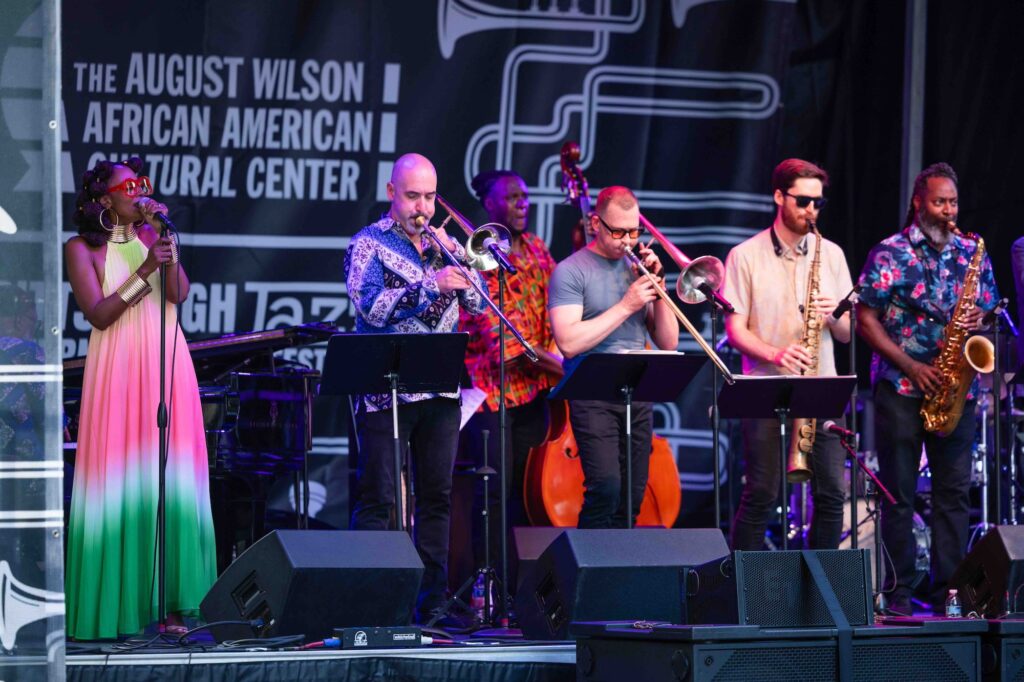Pianist Orrin Evans Proves To Be a Most Generous Bandleader
His modern, large-scale jazz ensemble performs fresh arrangements of jazz standards, occasional originals, and blues while supporting an all-star line-up of soloists and singers.

Orrin Evans Captain Black Big Band
‘Walk a Mile a Mile in My Shoe’
Imani Records
When listening to music, sometimes it’s best to not take lyrics too seriously. The latest release by pianist Orrin Evans and his Captain Black Big Band, “Walk a Mile a Mile in My Shoe,” opens with “Dislocation Blues,” a contemporary composition by Chris Whitley and Jeff Lang introduced on their album of that title in 2007. The text to this number essentially consists of a repetitive chant, “Where can a heretic call home?” It’s sung by guest Paul Jost over a background of horns and the funky electric organ of Jesse Fischer.
Clearly, this is a case when the question is more important than the answer, for none is forthcoming. Perhaps that’s because there’s nothing that the Captain Black Big Band does that could actually be described as heretical. In fact, this modern, large-scale jazz ensemble is doing exactly what all such groups are expected to do: perform fresh arrangements of jazz standards, occasional originals, and blues while supporting an all-star line-up of soloists and singers.
Mr. Evans premiered an early eight-piece incarnation of this ensemble when he was only 22, on his 1997 album “Captain Black,” and launched the current edition with the 2011 “Mother’s Touch.” Since that time, the band has evolved into a solidly entertaining attraction especially for outdoor jazz events, as they proved recently at the Pittsburgh Jazz Festival.
Mr. Evans, who also spent four years replacing Ethan Iverson as the pianist in the Bad Plus, is among the most self-effacing, apparently ego-free bandleaders on the scene. Of the nine songs on the current album, not one of the compositions or arrangements is his own, and he doesn’t hog the solo space, either. In fact, virtually all of his colleagues — it seems inappropriate to call them sidemen — solo as much as the leader does.

You’d expect such a group to have a solid roster of excellent players, and indeed it does, with star trumpeter Sean Jones and saxophonist Chris Coles among them; on the album, the band is joined by the New Orleans trumpet king, Nicholas Payton, and Mr. Fischer on organ.
Still, it’s rare to find a big band working with this many excellent singers. The best-known of these is Lisa Fischer, who has become the icon of a backup singer who rarely steps into the spotlight but is probably more talented than most of the stars she works with. Ms. Fischer delivers thoughtful, understated vocals on Harold Arlen’s “Blues in the Night” — Mr. Evans takes an agreeably bluesy solo here — as well as “Overjoyed,” a Stevie Wonder tune much heard in jazz contexts lately.
The album also features Paul Jost singing the blues on the opening and closing with David Gates’s “If,” which many of us know from the Sinatra version. There also are a couple of tracks with the postmodern soul singer Bilal; “Save the Children” is the best I’ve ever heard him. One surprise is Joanna Pascale on “Sunday in New York,” introduced swingingly by Mel Tormé over the main titles of a 1963 romantic comedy.
Yet one additional first-rate singer turned up with the band at Pittsburgh. Sy Smith sang “Overjoyed” at the festival and, even more memorably, gave us an imaginative re-arrangement of “Feelin’ Good” that opened with a vocal approximation of a hip-hop turntablist manipulating the scratching of a needle on vinyl grooves. I don’t think I’ve ever heard that before.
Both the concert and the album featured a stunning instrumental treatment of “Smoke Gets in Your Eyes” in which the six horns slowly phrase the classic Jerome Kern melody in a suitably slow, baroque fashion. It sounds both baroque and movingly hymn-like, and serves as a good companion piece to the album’s only other instrumental, titled “The Hymn.” This piece by John Raymond really sounds like nine instruments undertaking a collective prayer.
At Pittsburgh, Mr. Evans introduced the individual players in a novel way: the other eight musicians — six horns, three rhythm total — would chant, “I’m so glad I got to know you,” behind the leader as he announced warmly, “I’m so glad I got to know you, Sean Jones,” and so on.
As an ensemble, the Captain Black Big Band is unpredictable yet warm and familiar; there are many moments when you want to get up and boogie but others when you want to slow-dance romantically. Apart from being a major talent himself, Mr. Evans has more than proven his worth as a leader and presenter of talents other than his own. The only aspect of this group that I’m not sure of is its title; I have to wonder when Captain Black himself is going to put in an appearance.

